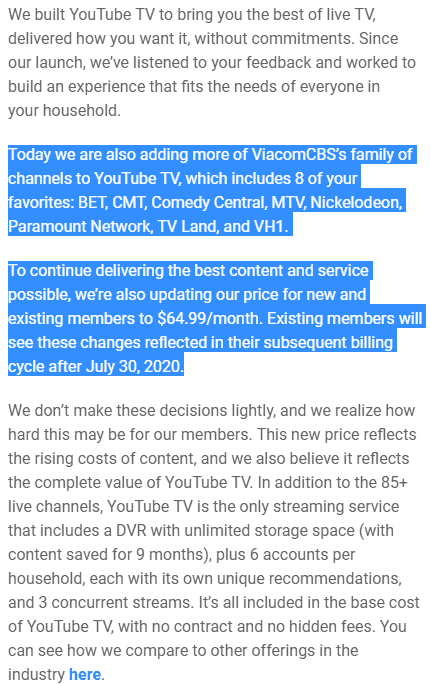 Comcast has switched back on its data caps and overlimit fees, but is upping allowances 20% — to 1.2 TB, after several years of a 1 TB allowance. Earlier this week, less stingy Cox boosted its caps by 25% to 1.25 TB.
Comcast has switched back on its data caps and overlimit fees, but is upping allowances 20% — to 1.2 TB, after several years of a 1 TB allowance. Earlier this week, less stingy Cox boosted its caps by 25% to 1.25 TB.
But what Comcast giveth with one hand, it taketh away with the other. Previously, customers that found themselves over the limit had two ‘get out of overlimit fees free’ cards per year, which meant overlimit fees did not apply. Now the company is reducing that to just one free pass per year. But be careful. If you exceed your allowance two or more times during a 12-month period starting with your first instance of going over your allowance, you will receive no more free passes, ever. If you have already exceeded your allowance during 2020, don’t worry, Comcast is resetting their counter to zero this one time.
Exceeding your allowance is costly. Comcast will bill you $10 for each 50 GB you exceed their cap, up to a maximum of $100 a month.
There are three ways to avoid Comcast’s data caps:
First, you can live in a state where Comcast does not cap internet usage. Most of those states are in the northeast. Unfortunately, most states are now data capped by Comcast: Alabama, Arizona, Arkansas, California, Colorado, Florida, Georgia, Idaho, Illinois, Indiana, Kansas, Kentucky, Louisiana, Michigan, Minnesota, Mississippi, Missouri, New Mexico, Western Ohio, Oregon, South Carolina, Tennessee, Texas, South Carolina, Utah, Southwest Virginia, Washington, and Wisconsin. Note, data caps do not currently apply to Xfinity Internet customers on Gigabit Pro service, Business Internet customers, customers on non-upgradable Bulk Internet agreements (condos, apartments, etc.), or customers with Prepaid Internet.
Second, you can choose the xFi Complete option for a costly $25/month. It includes unlimited data, whole home Wi-Fi service, and a xFi Gateway, including “Advanced Security” to block certain malicious website activity. If you bought these separately, it would cost $44/month. If you already lease a xFi Gateway, you can upgrade to xFi complete for an additional $11/month.
Third, you can purchase Unlimited Data for $30/month if you own and use your own cable modem and router. Existing customers can upgrade to the Unlimited Data plan now by calling 1-800-Xfinity or clicking here.
Data caps, allowances, and overlimit fees are completely arbitrary and do not reflect the actual cost of usage. Comcast argues that heavier users should pay more, even though their cost is nearly the same regardless of usage.


 Subscribe
Subscribe YouTube TV has announced the addition of eight new Viacom-owned networks to their lineup, but has also passed along word the price is going up 30%, from $49.99 to $64.99/mo effective from Tuesday for new customers, Aug. 1 for existing customers.
YouTube TV has announced the addition of eight new Viacom-owned networks to their lineup, but has also passed along word the price is going up 30%, from $49.99 to $64.99/mo effective from Tuesday for new customers, Aug. 1 for existing customers.
 Cox will return to data capping its broadband customers on Wednesday, July 1 but with a bigger usage allowance from now on.
Cox will return to data capping its broadband customers on Wednesday, July 1 but with a bigger usage allowance from now on. Chinese consumers are enjoying some of the lowest priced mobile plans in the world as several giant wireless companies compete to attract customers interested in 5G wireless service.
Chinese consumers are enjoying some of the lowest priced mobile plans in the world as several giant wireless companies compete to attract customers interested in 5G wireless service. Mobile handsets with built-in support for 5G are also getting cheaper every day, with prices starting at $210 US in China. Handset purchases are gradually growing as companies build out 5G capacity and coverage in their networks.
Mobile handsets with built-in support for 5G are also getting cheaper every day, with prices starting at $210 US in China. Handset purchases are gradually growing as companies build out 5G capacity and coverage in their networks. Ironically, Verizon’s $10 surcharge is more expensive than some Chinese carrier’s cheapest 5G mobile plans.
Ironically, Verizon’s $10 surcharge is more expensive than some Chinese carrier’s cheapest 5G mobile plans. Internet providers are preparing to cut off late-paying and non-paying customers as early as June 30, as the Federal Communications Commission’s “Keep America Connected” pledge expires next week.
Internet providers are preparing to cut off late-paying and non-paying customers as early as June 30, as the Federal Communications Commission’s “Keep America Connected” pledge expires next week. Those customers that lose service for non-payment may forfeit future participation in low-cost internet programs for those on public assistance, and cannot restart service without coming to terms on past due balances. That could leave desperate customers at risk of losing access to job-seeking information, education, and news about the ongoing pandemic.
Those customers that lose service for non-payment may forfeit future participation in low-cost internet programs for those on public assistance, and cannot restart service without coming to terms on past due balances. That could leave desperate customers at risk of losing access to job-seeking information, education, and news about the ongoing pandemic. Charter/Spectrum: The company has announced it will forgive a portion of past due balances and not require full repayment, if the customer or his/her job was directly impacted by the coronavirus. Spectrum’s offer of 60 days of free internet service introduced in March was accepted by at least 400,000 customers. But for most, the offer has since expired. Spectrum has worked to convert those at the end of the free offer into paid customers, but won’t disclose how much success they have had.
Charter/Spectrum: The company has announced it will forgive a portion of past due balances and not require full repayment, if the customer or his/her job was directly impacted by the coronavirus. Spectrum’s offer of 60 days of free internet service introduced in March was accepted by at least 400,000 customers. But for most, the offer has since expired. Spectrum has worked to convert those at the end of the free offer into paid customers, but won’t disclose how much success they have had. Comcast: Customers enrolled in the Xfinity Assistance Program are being given the option of repaying past due amounts in up to 12 equal monthly installments. After a repayment arrangement is made, some customers are persuaded to downgrade service to more affordable plans until past due amounts are repaid. Comcast’s offer of 60 days of free internet service has ended for most customers that enrolled shortly after it was introduced. Comcast has not announced a date when its 1,000 GB usage cap is scheduled to return in most service areas.
Comcast: Customers enrolled in the Xfinity Assistance Program are being given the option of repaying past due amounts in up to 12 equal monthly installments. After a repayment arrangement is made, some customers are persuaded to downgrade service to more affordable plans until past due amounts are repaid. Comcast’s offer of 60 days of free internet service has ended for most customers that enrolled shortly after it was introduced. Comcast has not announced a date when its 1,000 GB usage cap is scheduled to return in most service areas. Verizon: Verizon will continue service for “hundreds of thousands of customers” that enrolled in the Keep America Connected pledge program, as long as they agree to make regular payments as part of a special repayment plan that will be introduced for these customers in July. Customers will be billed a portion of their past due amounts along with current service charges until repayment has been made in full.
Verizon: Verizon will continue service for “hundreds of thousands of customers” that enrolled in the Keep America Connected pledge program, as long as they agree to make regular payments as part of a special repayment plan that will be introduced for these customers in July. Customers will be billed a portion of their past due amounts along with current service charges until repayment has been made in full.